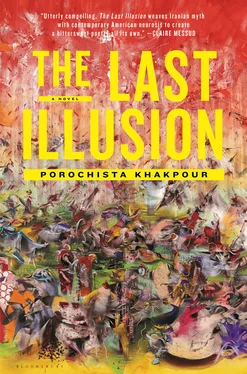Had he ever, in the time span of a stunt, outgrown it? Never, he thought. In his early days, when he was more of an endurance artist, the relentless preparation for a stunt would often leave him demoralized, doubting, or simply exhausted. But he was younger then, and he was the whole act, nothing more. He could control it, he could convey it, he was it. If anyone was to ask what it all meant, all he had to do was point to himself, his body, him. There were no further questions — just held breaths followed by a whole lot of relief: Bran Silber had survived again.
And then he outgrew simple survival. He suddenly had more wealth than he knew what to do with, and just making it for the masses seemed cheap, indulgent, and, of course, though he admitted it to no one, dangerous, especially as he grew older. He had to become an illusionist, even if it was less real, even if the stakes — no longer life or death — were not as high. He was not Houdini. And there was another layer to illusion — there was the outside world, the suggestion that the external universe was not what it appeared it to be, the notion that it could all be taken away, all gone at his whim, vision, insistence.
The Fall of the Towers: it was he, the god of this disaster, who was wishing them gone. No one had asked for it, no one had even thought of it. Why would the imagination go there, of all places?
What does it mean, Bran Silber? What is the meaning of all this?
Bran Silber found himself that season in a situation he never imagined he’d be in. He found himself absolutely inconsolably distraught. He found his mind wandering as he watched the businessmen, janitors, restaurant workers, and shopkeepers file in and out of work at the WTC, with a sense of purpose. He wondered what their world was really like, and he concluded that he envied them. After this last stunt, he would have to find the daily purpose illusion could no longer afford him. How could he go further? There had to be some other world.
He ignored the buzzing and ringing of his phone that seemed to go off all the time, at all hours, in those days, and he slowly, with much trepidation, walked into the room that had now become as much a torture cell as a meditation room for him: the Mirror Room. And he looked at himself and he looked at himself. What is the meaning of this, Bran? But he got nothing back. Just dead yellow eyes and a tired man in all black in his fifties. And he tried again to see himself as he had just weeks earlier, he tried his hardest to flash that insignia of his, his unforgettable blinding white-hot smile. And he couldn’t.
He remembered Bird Boy and his inability to smile. He had become like that, like a bird boy of sorts, with no joy, no connection to this world. The Bird Boy who had turned his back on him months ago and then come back recently with that e-mail, wanting to visit, wanting to see if he was okay, wanting to let him know he was in love, wanting his help even. My God, he thought, even Bird Boy, smileless Bird Boy, has love in his life.
Bran Silber saw something he rarely saw in the mirror: tears. They would not come out, however, as if even that was too much effort. He was, he had to admit, not just depressed but, in a way, its opposite: he was very, very afraid. And he could not even begin to acknowledge the feelings — so deep, so strange, so almost mystical — that those fears stirred up. All he focused on was the problem most obviously before him, the surface issue: he thought, My God, maybe there is no meaning. Maybe for once all I have in my hands is just a big fucking trick.

In the end, Zal had spared Asiya — rather, he’d looked at Asiya’s long rambling deliriously typoed e-mail drafts, declaring an apocalypse that only Bran Silber could avert for all of their sakes, and realized there was no way he could admit to Silber that he was associated with that girl — and deleted it all and written Silber himself. It was a short e-mail, an icebreaker of sorts, he hoped, something casual and easy, as if their break had never happened, as if they sent e-mails like that to each other all the time, old friends that they were. And he had gotten back the e-mail he deserved, also casual and easy, also pretending, also reeking of old times and bonds: Tricky week, even trickier week. If you come, just a whole lotta waiting. I could see you after but hard to know when it all wraps up. Very private here at moment. But if you don’t mind waiting. . Dream, B.X.S.
He read it out loud to Asiya.
“What’s the point of that?” she said. “We don’t need to hang out with him! We need his help.”
Zal almost corrected the we, and said, “But I thought if we went there, he could introduce us to the illusion and that would be the perfect opportunity to explain your. . your feelings on it.”
Asiya was pacing, disturbed. “We don’t have time for stuff like this, Zal! We’ve got to move.”
Zal groaned. “Asiya, I know you think there’s a deadline—”
“And it’s not like he’s exactly inviting us anyway! He’s saying it’s always inconvenient, but if we go over there, maybe there’s a slight chance—”
“He just talks like that!”
“Look, Zal, I’m willing to go there, but we can’t waste any time. I need him to know beforehand why we’re there. Then he’ll definitely meet us first thing, make the time for it urgently, you know.”
Zal tried to imagine the Silber he knew in confrontation — he could just see him in his deep tan and silver overalls, hands on his hips, poking fun at Bird Boy and his freak girlfriend, waving them off ultimately with a wail of a laugh, pawning them off on assistants while he argued with his illusion-engineering team. He then tried to imagine the Silber Asiya was seeing — a man in a black suit and top hat, like those real magicians of the past, or, better yet, a fortune-telling gypsy with a crystal ball who’d hear them with closed eyes and a grimace, who’d nod when they were done and make promises, ones he’d guarantee he could keep, ones that would, as Asiya said, with no irony whatsoever, save the world.
“Asiya, I do love you,” Zal began, trying to pump his voice full of patience, “but I need you to understand something.”
She looked at him pleadingly, as if to say her heart was in his hands — her heart and mind.
“There is no way I’m taking you to meet him, I’m sorry. I’m not going there, and neither are you. I agreed to give a letter, but that’s it.” He left his changed mind bare, unadorned, simple, naked; it was all he had.
Asiya ran her hands through her hair, tugging chunks in her fist along the way. “I can’t believe this! Do you know how irresponsible you’re being? We’re on the verge of an emergency here, Zal! Fuck you and your limits! I don’t need you, you know that?”
Zal sighed. “Great, well then do whatever you have to do yourself. Leave me out of this.”
“You are so, so, so selfish!” she snapped. “I’m disgusted! I’m horrified! I’m just—” and then she stopped, a pale hand coming up to meet her pale mouth. “My God.”
Zal looked up and away. Not again.
“Oh my God, Zal, I get it, I get it.”
Zal tried to fill his mind with other thoughts, to drown her out.
“Holy shit, Zal. .”
But it was hard to ignore her in general, much less when she got like that. “What, Asiya, what?”
She was backing up as if he were holding a weapon, as if he was out to get her, shaking her head, muttering something unintelligible, just barely mouthing whatever unutterable it was.
“Asiya, I need you to speak to me. What is it?”
Читать дальше













